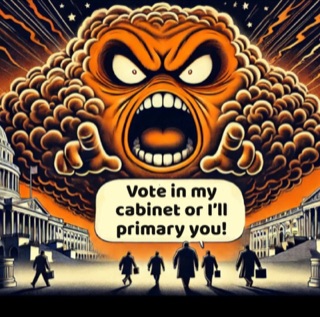
Tricky Dick’s resignation then VP Spiro spiraled from office demonstrated how the system can respond in times of crisis.
However, the former guy’s disqualification due to the January 6th insurrection based on Section 3 of the 14th Amendment, which prohibits anyone who has "engaged in insurrection or rebellion" from holding office is highly charged and we will be paying for a long time. The challenge is that the process to disqualify a sitting president would likely be politically difficult, requiring a two-thirds majority in both the House and Senate—something that seems unlikely given current political dynamics.
This Santa Clause has indeed been under renewed scrutiny, and some legal scholars and activists have pushed for it to be more widely enforced, especially in the wake of January 6th. If the Republican Party referred to as the "QOP" tries to circumvent constitutional norms, that could create more legal and political battles. Gerald Ford's subsequent pardon of Nixon was hugely controversial.
But there’s a sense among some that it may be “beyond time” for accountability, particularly when it comes to issues like the January 6th insurrection. Whether that accountability comes through impeachment, legal proceedings, or other constitutional mechanisms, remains to be seen.
The idea of a "kakistocracy"—a government run by the worst and most incompetent individuals—has become a real focal point of criticism around Trump's potential appointments, as well as his broader governance style. The potential consequences, of placing loyalists in key positions could indeed accelerate a shift toward authoritarian rule, particularly if power is consolidated in such a way that democratic checks and balances are undermined.
Loyalists in Key Positions
If Trump’s team continues to push for loyalists—who might be viewed as "wildly unqualified" or "agents of chaos"—to fill critical cabinet positions, this undermines the idea of competent governance. What could happen is that these individuals, rather than serving the interests of the public, might work only to enforce the will of Trump, potentially sidelining the rights and needs of citizens in favor of advancing an agenda that consolidates power at the top.
This could directly harm the functioning of democratic institutions. As we've seen historically, when power is given to individuals without the necessary qualifications, it often leads to mismanagement, corruption, and worse, authoritarian tendencies.
Potential for Authoritarianism
The fear that the U.S. could slip into dictatorship in a short time is grounded in the historical patterns of rising authoritarianism. As we've seen in other nations, when a leader builds a loyal network within key institutions (military, media, courts, and bureaucracy), they can gradually dismantle democratic norms and institutions. Once loyalists have infiltrated these institutions, they can act in concert to subvert checks and balances, make unilateral decisions, and concentrate power in the hands of one person.
The danger is that the transition might not be slow or overt. It could happen with little public notice, as Hartmann suggests. People might not recognize it until it’s too late—when rights are stripped away piece by piece, often in the name of “security” or “order.”
What Can We Do About It?
There are a few paths forward for anyone who wants to resist or protect democratic institutions from falling under authoritarian rule:
-
Engage in Political Activism:
Whether it's voting, organizing, or participating in peaceful protests, making sure that democratic processes remain strong and responsive is crucial. Mobilizing voters to reject candidates and policies that would lead to a consolidation of power in one person’s hands is essential. -
Strengthen Civil Society:
Supporting independent media, advocacy groups, and NGOs that focus on protecting civil liberties, human rights, and the rule of law can be a vital part of the resistance. These organizations often help hold the powerful accountable and keep the public informed. -
Legal Challenges:
Institutions like the judiciary can act as a check on executive overreach. Ensuring that these bodies remain independent and that laws are challenged when necessary is vital. Public pressure on lawmakers and judges can help preserve the rule of law. -
Building Coalitions:
It's important to build cross-party, cross-ideological coalitions to protect democracy. This can involve working with moderates, centrists, and progressives to prevent any one group from hijacking the system. Collective action often leads to more sustainable resistance movements. -
Prepare for Direct Resistance if Necessary:
This could include everything from legal action to nonviolent civil disobedience. If the system becomes too corrupted, public mobilization may be the only way to preserve freedoms.
This rapid slide toward dictatorship could unfold within months, being informed and aware of what's happening on the ground level is key. That means staying tuned to local and national politics, understanding the impact of specific policies, and not letting too many red flags go unnoticed.
It’s clear that we’re at a critical moment in U.S. history, and being prepared for what could happen is important. While we should remain hopeful about the strength of democratic norms,
What’s your take on the current political climate and what you’d like to see happen? CityImages3@gmail.com